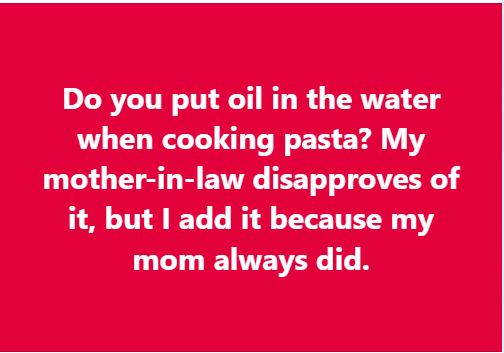
ADVERTISEMENT
The Great Pasta Debate: To Oil or Not to Oil?
ADVERTISEMENT
When it comes to cooking, family traditions often shape our habits in the kitchen. For many, these practices are more than just culinary techniques—they are a connection to the past, a way to honor the way things were done by those who came before us. Yet, as families grow and merge, so do their culinary traditions, leading to debates over the “right” way to prepare even the simplest of dishes. One such debate that has stood the test of time is whether or not to add oil to the water when cooking pasta.
**The Tradition of Adding Oil**
For some, the act of adding oil to pasta water is almost second nature. Passed down from generation to generation, this practice is often done without much thought. It’s what mom did, and her mom before her, so why question it? The reasoning behind it is often practical—many believe that adding oil to the water helps prevent the pasta from sticking together. This is especially important when cooking large batches or when the pasta might sit for a while before being served.
**The Opposition’s Argument**
On the other hand, many culinary experts, including renowned chefs and traditionalists, argue against this practice. They claim that adding oil to the water can do more harm than good. The primary concern is that the oil creates a barrier on the surface of the pasta, preventing the sauce from adhering properly. After all, what’s the point of a perfectly cooked pasta if it can’t hold onto the delicious sauce meant to accompany it?
ADVERTISEMENT
This difference in opinion often leads to lively discussions, particularly in households where culinary traditions collide. For instance, as the image suggests, a mother-in-law disapproving of the oil practice might spark a debate with her daughter-in-law, who clings to the tradition because it’s what her own mother always did.
**Science in the Kitchen**
The science behind cooking pasta actually sides with the opposition. When pasta cooks, it releases starch into the water, which can cause the pasta to stick together. However, this issue can be mitigated by using a large pot of boiling water, stirring the pasta occasionally, and serving it immediately after draining. The addition of oil is unnecessary and might even hinder the final dish.
Moreover, if the pasta is cooked al dente—firm to the bite—and tossed immediately with the sauce, the need for oil becomes even less justified. The sauce will cling beautifully to the pasta, ensuring each bite is flavorful.
**Honoring Traditions While Embracing Change**
ADVERTISEMENT
However, cooking is as much about tradition and family as it is about technique. For many, adding oil to the pasta water is not just a method; it’s a memory, a way to stay connected to their roots. In such cases, the act itself might hold more significance than the technical correctness of the practice.
In the end, whether you choose to add oil to your pasta water or not, the most important thing is that you’re enjoying the process and the meal with loved ones. Cooking is an art, and like all art, it is subject to interpretation and personal preference. So, if adding a splash of oil to your water brings you a sense of comfort and nostalgia, then by all means, continue the tradition. Just be sure to serve your mother-in-law a plate of pasta that’s so delicious, she’ll forget all about the oil debate!
—
I hope you enjoyed this article! If you have any further requests or adjustments, feel free to ask.
ADVERTISEMENT




